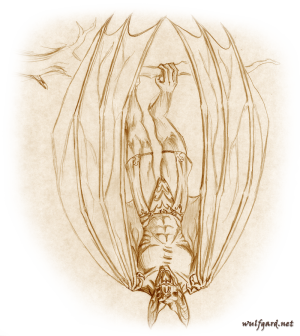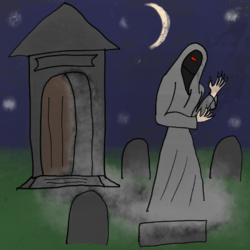Difference between revisions of "Vampire"
| Line 2: | Line 2: | ||
==Appearance== | ==Appearance== | ||
Vampires most often appear much as they did in life, so long as they drink enough mortal blood. In this way, they continue to live among their own kind and trick them into believing they are trustworthy. In truth, they are undead abominations, parasitic in nature. The only elements that may betray a vampire’s true nature is that their skin is often pale, save for immediately after feeding. If someone avoids the sunlight, it is also likely they may be a vampire. Some vampires may also bear hideous cauls, particularly those that dwell near swamps, though many vampires are said to be alluring instead. | Vampires most often appear much as they did in life, so long as they drink enough mortal blood. In this way, they continue to live among their own kind and trick them into believing they are trustworthy. In truth, they are undead abominations, parasitic in nature. The only elements that may betray a vampire’s true nature is that their skin is often pale, save for immediately after feeding. If someone avoids the sunlight, it is also likely they may be a vampire. Some vampires may also bear hideous cauls, particularly those that dwell near swamps, though many vampires are said to be alluring instead. | ||
| + | [[File:Bestiary_vampire_s.png|250px|thumb|A bestiary depiction of a vampire.]] | ||
==Powers== | ==Powers== | ||
The abilities of a vampire are many and terrifying. Vampires may influence the minds of many mortals, and the most powerful may even force others to do their bidding. They cannot, however, exert this control over animals. Not all vampires possess these powers, as it seems to be true that some form of vampire hierarchy exists, generally with one vampire ‘sire’ ruling other, lesser vampires. | The abilities of a vampire are many and terrifying. Vampires may influence the minds of many mortals, and the most powerful may even force others to do their bidding. They cannot, however, exert this control over animals. Not all vampires possess these powers, as it seems to be true that some form of vampire hierarchy exists, generally with one vampire ‘sire’ ruling other, lesser vampires. | ||
Revision as of 00:30, 27 June 2021
A horror shrouded in mystery, the vampire comes in many forms. Men, or even elves and other beings, cursed with vampirism are doomed to live cursed lives as undead. What gods wrought this curse upon the world remains unknown, but there is little doubt some form of archdemons were involved. What we do not know, however, is why the gods would allow something so terrible to exist. Most of this article is comprised of excerpts from Vita Mortis, by Grigore Summers.Contents
Appearance
Vampires most often appear much as they did in life, so long as they drink enough mortal blood. In this way, they continue to live among their own kind and trick them into believing they are trustworthy. In truth, they are undead abominations, parasitic in nature. The only elements that may betray a vampire’s true nature is that their skin is often pale, save for immediately after feeding. If someone avoids the sunlight, it is also likely they may be a vampire. Some vampires may also bear hideous cauls, particularly those that dwell near swamps, though many vampires are said to be alluring instead.
Powers
The abilities of a vampire are many and terrifying. Vampires may influence the minds of many mortals, and the most powerful may even force others to do their bidding. They cannot, however, exert this control over animals. Not all vampires possess these powers, as it seems to be true that some form of vampire hierarchy exists, generally with one vampire ‘sire’ ruling other, lesser vampires.
Shape-shifting
The shapeshifting abilities of the vampire are legendary, though little is known about them. Some say vampires turn into bats and man-bat monstrosities. Other vampires seem to bear more resemblance to rats. Some do not exhibit animalistic traits at all and instead appear something more akin to a demon. Most all vampires are in some way associated with mist and becoming mist to move from place to place. It is said a vampire may assume these forms at will, though if they intake too much blood, they may enter a monstrous form in a more permanent state.
Blood Addiction
Perhaps the best-known quality of vampires is their need to feed upon the blood of mortals. Without this blood, they will enter a state of deep undeath, returning to a corpse-like state and appearance. If this goes too far, they will become entirely dormant until blood is administered, reawakening the vampire. If they drink enough blood, vampires may appear entirely ordinary, as they did in life. However, if a vampire gorges itself, it will become more animalistic and lose its common sense and intelligence, becoming a bestial creature that longs only for still more blood. In this way, demons have forced vampires to exist tenuously based upon controlling their own urges, and they absolutely require the life-blood of mortals to exist. A vampire cannot drink corpse blood as opposed to blood from a living creature, or it will cause them great illness. Likewise, the blood of an animal is said to cause them madness. They must drink only the blood of noble mortal beings. This is yet another reason they must be destroyed.
Reproduction
As unnatural abominations, vampires cannot reproduce and must instead be created through demonic rituals that remain largely mysterious. It is said that the vampire must bite and drain all blood from the victim, then a ritual is performed by the vampire in order to share the curse and damn the victim’s soul. Six days after this is performed, the victim’s once dead body will enter an undead state and return as a new vampire.
A victim of a vampire may have bite marks on their throat, wrist, or stomach. Some vampires are said to bite between the eyes, though this is likely to be hearsay. The legends surrounding vampires abound, and it is difficult to know which are true and which are not.
Weaknesses
Although they are said to be impossible to kill, vampires can at least be deterred. They fear the sun above all else, as well as any object or ground blessed by the gods. Running water burns them like acid. Silver, as well, can be used against them with great effectiveness. Some methods may be undertaken to prevent one from returning as a vampire, such as staking the body into the coffin before burial. Beheading a vampire, cutting out their heart, burning the heart, and drinking the ashes is one way to prevent the vampire’s return.
Another favorite of vampire hunters is a blessed stake driven through the vampire’s heart. This also pins the vampire’s husk that passes for its soul, not allowing it to escape in the form of mist. However, the Venatori have learned that while vampires shun sunlight and will burn in it, they are not instantly destroyed by it and may even survive in the sun, especially if they wear some form of heavy clothing for protection. The light, however, will always temporarily blind their eyes.
The First
Among the most frightening of vampire legends are the First, said to be the first vampires to ever exist in Midgard. Where these vampires are now remains unknown, but many claim they still live on since time immemorial, haunting civilization and hunting mortals - while perhaps also ruling them.
Recent History
Should there be any suspicion of a vampire in the area, the Venatori should be notified as soon as possible. Throughout their existence, hunting vampires has remained one of their most important, if also most difficult, tasks. The threat of a vampire is not taken lightly, however, and their presence must be confirmed before the vampire can be slain, particularly as it can be difficult to truly determine if one bears the curse of vampirism.

